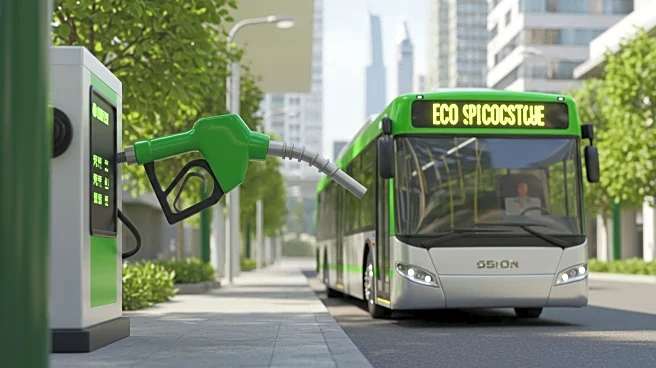What is the story about?
What's Happening?
Clean Energy has announced several new agreements with transit fleets and municipalities across the United States to transition their vehicles to renewable natural gas (RNG). These deals involve building and upgrading fueling infrastructure, maintaining and operating station sites, and supplying RNG fuel for public buses, refuse trucks, street sweepers, and other vocational vehicles. Notable agreements include the Los Angeles County Metropolitan Transportation Authority, which will fuel over 940 natural gas buses with 11.5 million gallons annually, and the Interurban Transit Partnership in Grand Rapids, Michigan, which will receive 1.1 million gallons of RNG annually. Other agreements have been made with transit agencies in Fort Worth, Texas; Birmingham, Alabama; Loudoun County, Virginia; El Paso, Texas; Tucson, Arizona; Union City, California; and Kings County, California.
Why It's Important?
The expansion of RNG supply by Clean Energy represents a significant shift towards sustainable transportation solutions in the U.S. RNG is a cleaner alternative to traditional fossil fuels, helping cities and transit agencies reduce their carbon footprint and improve air quality. This move aligns with broader environmental goals and provides cost-effective solutions that can be implemented immediately, avoiding the high costs and infrastructure barriers associated with other alternatives. The adoption of RNG by major transit agencies indicates a growing trend in the transportation sector towards sustainability, potentially influencing other industries to follow suit.
What's Next?
As Clean Energy continues to expand its RNG supply agreements, more transit agencies are likely to consider transitioning to RNG to meet sustainability goals. The company plans to build new fueling stations and upgrade existing facilities to accommodate the growing demand for RNG. This expansion may lead to increased partnerships with bus manufacturers and other stakeholders in the transportation industry, further promoting the use of RNG. Additionally, cities and transit agencies may explore additional ways to integrate RNG into their operations, potentially leading to further reductions in emissions and improvements in air quality.
Beyond the Headlines
The shift to RNG not only impacts environmental sustainability but also has economic implications. By reducing reliance on traditional fossil fuels, transit agencies can potentially lower operational costs and improve efficiency. This transition may also drive innovation in the transportation sector, encouraging the development of new technologies and infrastructure to support RNG use. Furthermore, the widespread adoption of RNG could influence public policy, leading to increased support for renewable energy initiatives and investments in clean technology.

















